- Places
- Plans
- Itineraries
- Experiences
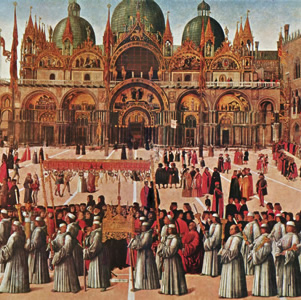 Accademia Galleries ★★★ - If you only make time for one museum in Venice, make it the Accademia. The collections comprise the world's greatest treasure trove of Venetian art, covering the giants of Venetian painting from the 13th to the 18th centuries: Titian, Tintoretto, Paolo Veneziano, Giorgione, Giovanni Bellini, and Carpaccio... » more
Accademia Galleries ★★★ - If you only make time for one museum in Venice, make it the Accademia. The collections comprise the world's greatest treasure trove of Venetian art, covering the giants of Venetian painting from the 13th to the 18th centuries: Titian, Tintoretto, Paolo Veneziano, Giorgione, Giovanni Bellini, and Carpaccio... » more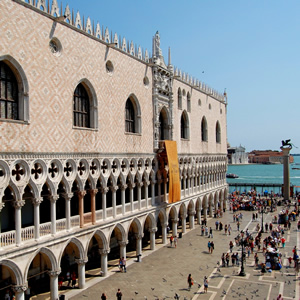 Doge's Palace (Palazzo Ducale) ★★★ - The sumptuously decorated seat of Venetian power for 900 years, the Ducal Palace ostentatiously displays the wealth of this formerly mighty maritime republic with grand rooms saddled in Renaissance masterpieces (by Tintoretto, Titian, Veronese, etc.)—and the famous Bridge of Sighs over to the state prisons—but the best way to see it—and unlock its history—is to take the Secret Itineraries tour of the hidden hallways, secret chambers, and prison cells (from which Casanova famously escaped) that lie secreted behind the walls and gilded frippery... » more
Doge's Palace (Palazzo Ducale) ★★★ - The sumptuously decorated seat of Venetian power for 900 years, the Ducal Palace ostentatiously displays the wealth of this formerly mighty maritime republic with grand rooms saddled in Renaissance masterpieces (by Tintoretto, Titian, Veronese, etc.)—and the famous Bridge of Sighs over to the state prisons—but the best way to see it—and unlock its history—is to take the Secret Itineraries tour of the hidden hallways, secret chambers, and prison cells (from which Casanova famously escaped) that lie secreted behind the walls and gilded frippery... » more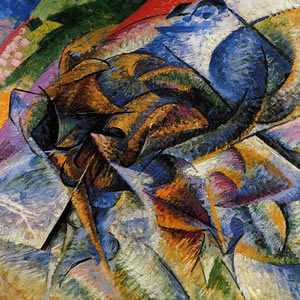 Peggy Guggenheim ★★ - One of Europe's most complete surveys of avant garde art from the early and mid–20th century in the private 18th-century palazzo that belonged to the collector herself, Peggy Guggenheim. There are works by her short-time hubby Max Ernst, by her greatest discovery Jackson Pollock, and by such modern masters as Picasso, Miró, Mondrian, Brancusi, Duchamp, Kadinsky, Chagall, Dalí, Marini, and Giacometti... » more
Peggy Guggenheim ★★ - One of Europe's most complete surveys of avant garde art from the early and mid–20th century in the private 18th-century palazzo that belonged to the collector herself, Peggy Guggenheim. There are works by her short-time hubby Max Ernst, by her greatest discovery Jackson Pollock, and by such modern masters as Picasso, Miró, Mondrian, Brancusi, Duchamp, Kadinsky, Chagall, Dalí, Marini, and Giacometti... » more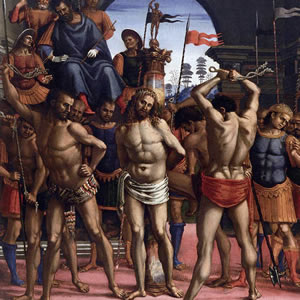 Ca' d'Oro ★★ - Venice's 15th-century "Golden Palace" is one of the best preserved and most impressive of the hundreds of patrician palazzi lining the Grand Canal. After the Palazzo Ducale, it's the city's finest example of Venetian Gothic architecture. Inside is a museum housing sculptures, furniture, 16th-century Flemish tapestries, ceramics, an impressive collection of bronzes (12th–16th century), and a painting gallery including canvases by Andrea Mantegna, Titian, Tintoretto, Carpaccio, Van Dyck, Giorgione, and Jan Steen... » more
Ca' d'Oro ★★ - Venice's 15th-century "Golden Palace" is one of the best preserved and most impressive of the hundreds of patrician palazzi lining the Grand Canal. After the Palazzo Ducale, it's the city's finest example of Venetian Gothic architecture. Inside is a museum housing sculptures, furniture, 16th-century Flemish tapestries, ceramics, an impressive collection of bronzes (12th–16th century), and a painting gallery including canvases by Andrea Mantegna, Titian, Tintoretto, Carpaccio, Van Dyck, Giorgione, and Jan Steen... » more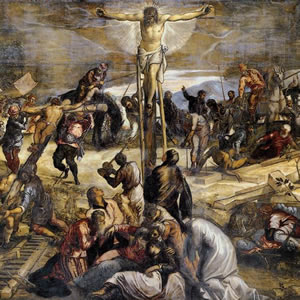 Scuola Grande di San Rocco ★★ - A lay confraternity (think of its as a Renaissance gentlemen's club) decorated in carved wood and more than 50 exquisite paintings by Tintoretto, the largest collection of his works anywhere (he got the commission by impressing the judges by secretly installing a finished painting in one of the rooms rather than simply submitting a sketch). Look into attending a chamber orchestra concert in the evocative rooms sponsored by the Accademia di San Rocco (www.musicinvenice.com)... » more
Scuola Grande di San Rocco ★★ - A lay confraternity (think of its as a Renaissance gentlemen's club) decorated in carved wood and more than 50 exquisite paintings by Tintoretto, the largest collection of his works anywhere (he got the commission by impressing the judges by secretly installing a finished painting in one of the rooms rather than simply submitting a sketch). Look into attending a chamber orchestra concert in the evocative rooms sponsored by the Accademia di San Rocco (www.musicinvenice.com)... » more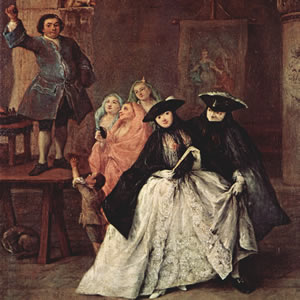 Ca' Rezzonico ★ - This handsome 17th-century canalside palazzo by Baldassare Longhena was the final home of poet Robert Browning. It is now a museum of 18th century life and arts, offering an intriguing look into what living in a grand Venetian home was like in the last days of the grand Republic. It's also a splendid backdrop for a collection of period paintings (especially works by Tiepolo, Guardi, and Longhi), furniture, tapestries, and artifacts... » more
Ca' Rezzonico ★ - This handsome 17th-century canalside palazzo by Baldassare Longhena was the final home of poet Robert Browning. It is now a museum of 18th century life and arts, offering an intriguing look into what living in a grand Venetian home was like in the last days of the grand Republic. It's also a splendid backdrop for a collection of period paintings (especially works by Tiepolo, Guardi, and Longhi), furniture, tapestries, and artifacts... » more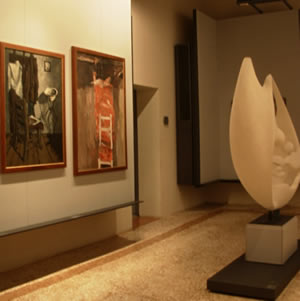 Ca' Pesaro - Sometimes the effort of appreciating all that Gothic, Renaissance, and baroque art can just wear you down. This is why the Ca' Pesaro's two collections—a gallery of modern art and an Asian art museum—make for a welcome break. Don't worry; you still get a fix of late Renaissance/early baroque architecture from the ponderous palace itself, squatting on the Grand Canal across and just up from the more elegant Ca' D'Oro, and designed in the middle of the 17th century by Baldassare Longhena (same dude who built the Ca' Rezzonico and Santa Maria della Salute church)... » more
Ca' Pesaro - Sometimes the effort of appreciating all that Gothic, Renaissance, and baroque art can just wear you down. This is why the Ca' Pesaro's two collections—a gallery of modern art and an Asian art museum—make for a welcome break. Don't worry; you still get a fix of late Renaissance/early baroque architecture from the ponderous palace itself, squatting on the Grand Canal across and just up from the more elegant Ca' D'Oro, and designed in the middle of the 17th century by Baldassare Longhena (same dude who built the Ca' Rezzonico and Santa Maria della Salute church)... » more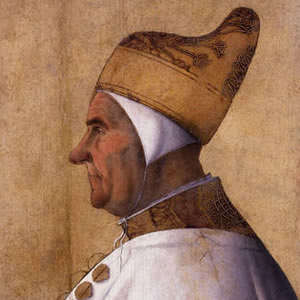 Museo Civico Correr - A nice little hodgepodge of collections installed above the arcades alongside Piazza San Marco. The best of this trio of city museums is the art gallery (good Carpaccios, plus works by all three Bellinis—Jacopo and sons Giovanni and Gentile). The others are devoted to, respectively, Venetian history (read: lots of paintings of ships) and the Risorgimento (Italy's 19th century unification movement; the sort of thing every Italian kid studies ad nauseam in school but, frankly, no one else cares about). Hard to believe it's nearly always empty when, across the square, St. Mark's is packed to the gills... » more
Museo Civico Correr - A nice little hodgepodge of collections installed above the arcades alongside Piazza San Marco. The best of this trio of city museums is the art gallery (good Carpaccios, plus works by all three Bellinis—Jacopo and sons Giovanni and Gentile). The others are devoted to, respectively, Venetian history (read: lots of paintings of ships) and the Risorgimento (Italy's 19th century unification movement; the sort of thing every Italian kid studies ad nauseam in school but, frankly, no one else cares about). Hard to believe it's nearly always empty when, across the square, St. Mark's is packed to the gills... » more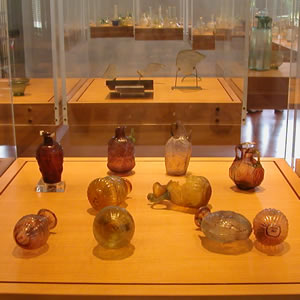 Museo del Vetro (Museum of Glass) - This small museum on the outlying island of Murano tells something of the history of Venice's famous glassblowing industry—which was historically centered not on Venice itself but on the outlying island of Murano in the northern lagoon. You can examine a large collection of glass objects from ancient Roman times through the 19th century as well as see displays on the history and practice of the craft itself (as pictured to the left)... » more
Museo del Vetro (Museum of Glass) - This small museum on the outlying island of Murano tells something of the history of Venice's famous glassblowing industry—which was historically centered not on Venice itself but on the outlying island of Murano in the northern lagoon. You can examine a large collection of glass objects from ancient Roman times through the 19th century as well as see displays on the history and practice of the craft itself (as pictured to the left)... » more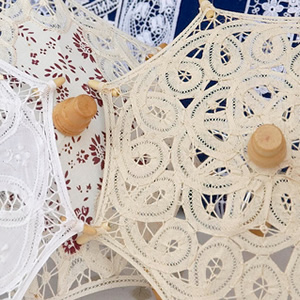 Museo del Merletto (Museum of Lace) - A museum of lace-making on the island of Burano that was originally founded as an institute to help keep the craft tradition alive... » more
Museo del Merletto (Museum of Lace) - A museum of lace-making on the island of Burano that was originally founded as an institute to help keep the craft tradition alive... » more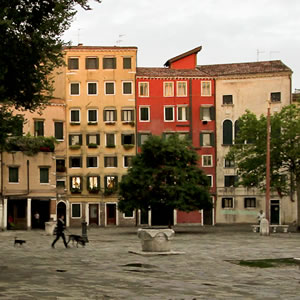 Museo Ebraico - This museum of Jewish life and history in Venice in the historic Jewish Ghetto ("ghetto" wasn't originally a derogatory term, rather it was the Venetian dialect name for the neighborhood in which the city's Jews lived—though, admittedly, their movements were at times greatly restricted) comprises a collection of 16th– to 19th-century artifacts. Even more rewarding, however, is to take the museum's tour that gets you into several of the neighborhood's five historic and beautiful synagogues that were built during the Ghetto's heyday in the 16th century... » more
Museo Ebraico - This museum of Jewish life and history in Venice in the historic Jewish Ghetto ("ghetto" wasn't originally a derogatory term, rather it was the Venetian dialect name for the neighborhood in which the city's Jews lived—though, admittedly, their movements were at times greatly restricted) comprises a collection of 16th– to 19th-century artifacts. Even more rewarding, however, is to take the museum's tour that gets you into several of the neighborhood's five historic and beautiful synagogues that were built during the Ghetto's heyday in the 16th century... » moreThere are several ways ReidsItaly.com helps you browse the sights of Venice, each neatly tucked into its own box below. You can get quick lists of all the top sights—the ones no one wants to miss when they visit Venice—or of all the attractions that are free of charge.
Or you can check out Reid's List, a thoroughly subjective compendium of some of my favorite, slightly less famous sights and experiences.
If you prefer thematic categories, you can see all the major museums or churches or palazzi at once, or if you're looking for something else to see or do nearby a major sight, you can peruse everything by neighborhood.
If you like to leave the planning of the daily itinerary to others, you can also sign up for a guided tour or two.
Or, if you want help cramming as much of it all as possible into your visit, you can peruse our perfect itineraries for one, two, or three days in Venice.
The top half-dozen or so sights listed under each category above are just a sampling. If you want to read short, one-line reviews of all sights within a category, click on the category title (or you can click on an individual sight for a quick link to its full description).
I have rated every sight and experience in Venice from zero to three stars.
Three stars, two stars, etc. are fairly self-explanatory—but note that it's not that the "no-star sights" are not worth the bother.
In fact, in any other city they'd probably rank much higher. They're just cursed to be in Venice, competing for your precious vacation time alongside St. Mark's Basilica, the Accademia Gallery, and a gondola ride—all solid three-stars.
This is a purely subjective rating, but it will help you get a sense of which sights pack the highest wow factor—and where to spend your time. In fact, you could view the starts thusly:
Planning your day: You could spend an afternoon in Venice, a day or two, or a week and never run out of things to do and new corners to discover.
I would try to give Venice at least a day and a half. Three days would be better, but most people don't have that kind of time, even for Venice.
I have suggestions for how to spend anywhere from half a day in Venice up to three full days on the Venice itineraries pages.
Venice is a city that, at first glance, seems excessively touristy and overrun. Some visitors can't wait to move on to someplace that feels a bit less like a canal-rodden Disneyland.
However, given time (and purposefully getting lost once or twice), Venice reveals its serenissima side and begins to seduce even the most jaded of travelers.
There are several cumulative ticket museum passes and discounts for pre-booking Venice:
Share this page
Search ReidsItaly.com